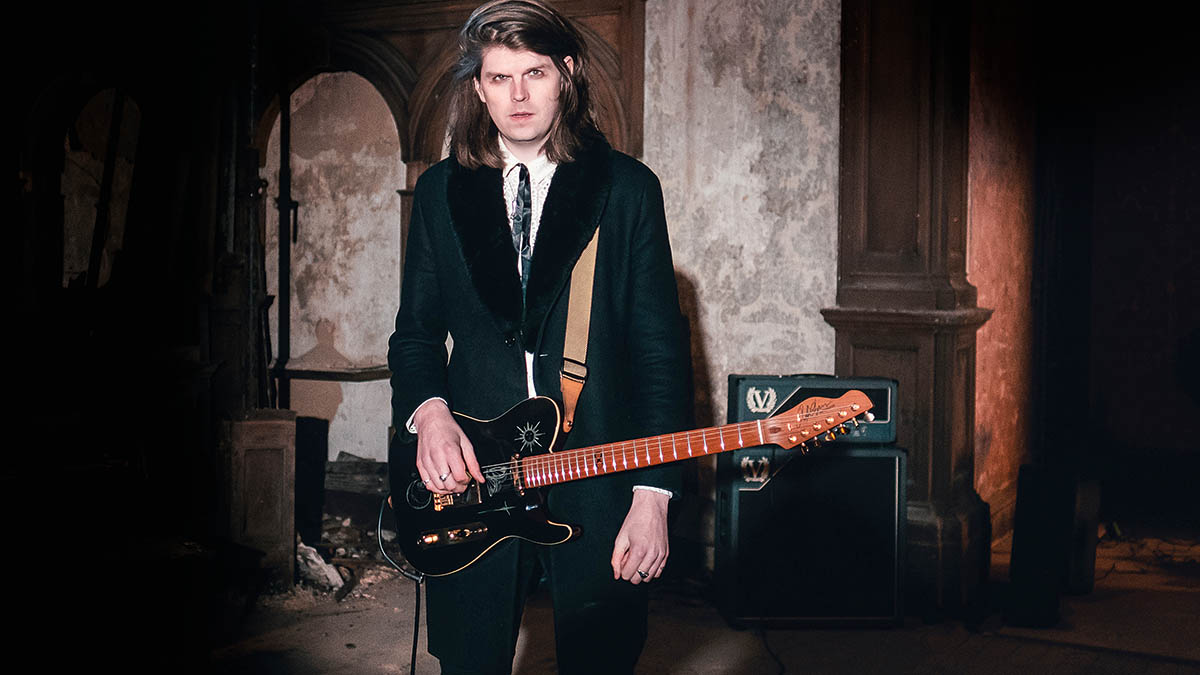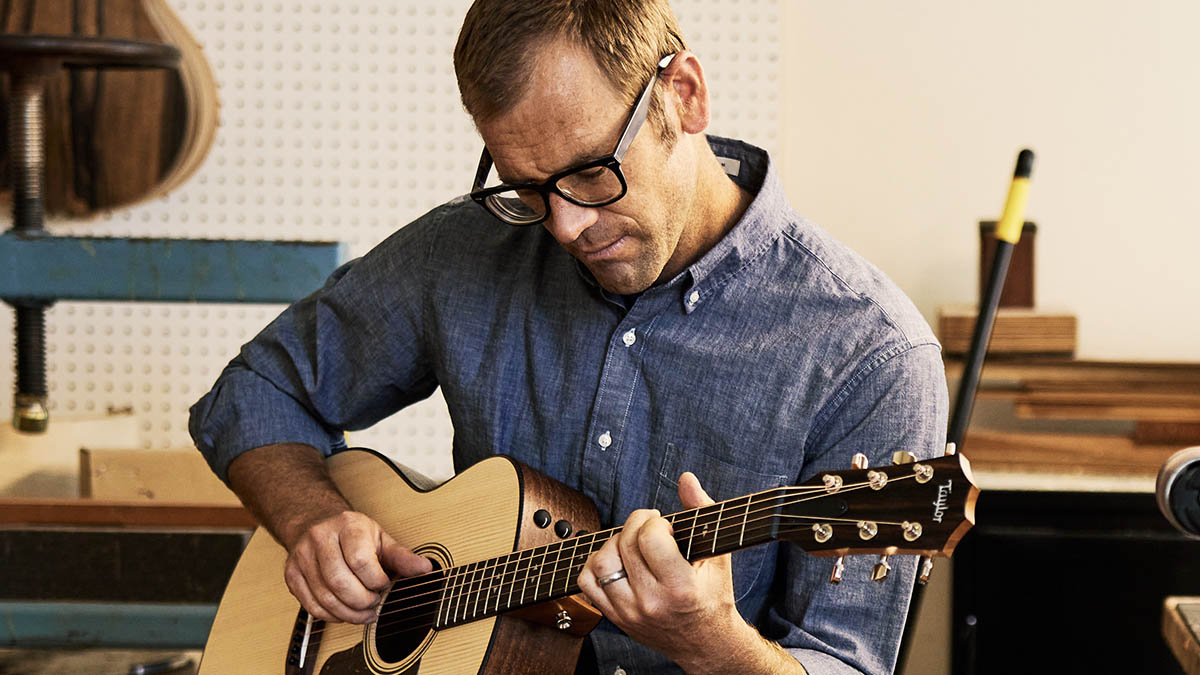Oddball studio experiments, going “full Spinal tap,” and “stinky riffs“: how Tigercub’s Jamie Hall is bringing bonkers guitar to the mainstream
Step inside the weird world of Tigercub, where no-name transistor amps, headphones used as microphones and abyssal drop-tuned riffs helped concoct their most recent album, The Perfume of Decay

As purveyors of abyssal drop-tuned riffs, grizzly tones and unsettlingly spiky leads, there has never been anything soft or cuddly about the Tigercub sound – despite what the name might suggest. And their third album, The Perfume Of Decay, sees the Brighton-based trio becoming a fully grown, snarling beast of a band.
“The manifesto going in was to be as big and as unapologetic as we could,” explains Jamie Hall – the seven-foot-tall, self-described “weird dude” who masterminds the band’s ever-enthralling creative output in his capacities as guitarist, songwriter, frontman, and producer. “I am who I am, and I just have to try and let my personality come through on whatever I’m trying to do,” he smiles.
Hall's penchant for juxtaposing soft but sinister lullaby vocals against colossal riffs has led to frequent comparisons with Queens Of The Stone Age leader Josh Homme. “It’s so hard not to get compared to other guitar players,” Hall says.
But he has a theory as to what makes his band such a stand out in the somewhat overcrowded ‘detuned rock space’. “There’s a lot of wrong-footing people in Tigercub songs,” he explains. “Every so often it’ll go a little bit weird, but it does have that ultimate accessibility. That’s just who we are.”
It’s an intoxicatingly sweet and sour blend that also caught the ear of Pearl Jam’s Stone Gossard, landing the band a deal with his label, Loosegroove Records – the very same label that brought the world Queens Of The Stone Age’s debut way back in 1998.
Acutely aware that the signing would likely expose the band to a much bigger audience, and with sights set on conquering America with album three, Hall set about upping his game in every way possible.
“I wanted to make something that could really own the attention we’re getting,” he stresses. The biggest challenge, as he puts it, was: “How do we grow and how do we allow ourselves to appeal to a wider audience, while staying true to who we are, and not chasing popularity and becoming a shit band because of it?”
All the latest guitar news, interviews, lessons, reviews, deals and more, direct to your inbox!
As a songwriter, Hall has always instinctively leaned towards catchy songs. “I like to have the chorus come in quick and for the song to be finished in two and a half to four minutes,” he says.
But among the radio-friendly elements – designed to be enjoyed at high volume while cruising on long car journeys, just as the band did while touring North America last year – he weaves plenty of idiosyncrasies and displays of technical ability into the music to keep listeners on their toes.
He says of the new album’s title track: “The Perfume Of Decay really is a unique and bizarre lead line. It’s sort of chromatic but not, and it’s so hard to play because there’s loads of string skipping and fingerpicking to be done.” He adds with a smile: “I’m really pleased that I’ve managed to have something that’s getting pushed out to this many people. That’s so fucking bonkers!”
You should always use your ears. Whatever sounds the best is the best
Elsewhere on the album, Deftones-inspired chuggery meets shoegazing noise swells, and further sonic inspirations sprawl from the Études of Chopin to the 1990s doom metal scene, via the classic sounds of Jimmy Page and Tony Iommi. And at the crux of it all lies Hall's own gutsy guitar tone.
On 2021 album As Blue As Indigo, he’d relied on a Fender Jaguar HH and a selection of “traditional old-school amps” – like the Hiwatt Custom 50, WEM Dominator and Vox AC30 – for his densely layered, angular sound. Nowadays, he has endorsements with modern builders like Chapman Guitars and Victory Amps, and likes to use an ML3 Pro – lightly modded with the addition of a Seymour Duncan Hot Rails – in combination with one of Victory’s compact, tour-friendly V4s while out on the road.
But for The Perfume Of Decay, he tells us that he “went full Spinal Tap” to achieve the monstrous, in-your-face rock sound that characterises the record. “It was an '80s Gibson Les Paul into an old Marshall JCM800 into a 4x12 – with everything on fucking 10 – mic’d up with a ’57. I realised I’ve spent my entire life as a guitarist resisting this because it’s just ‘the done thing,’” he laughs, before supplying a sage maxim for gearheads to live by.
“You should always use your ears,” he says. “Whatever sounds the best is the best. We could’ve used something off the beaten track like a Selmer head – which I did use on As Blue As Indigo and it was really cool – but it didn’t get me to the finish line nearly as quickly or effectively. I even used a wah-wah pedal, so it was full Guns N’ Roses territory. It was proper '80s!”
But the album doesn’t sound remotely like a hair metal throwback because Hall's off-kilter sonic leanings are still stamped upon it with a few choice layers of what he describes as supplementary “tone building.“
He explains: “I was trying to take something classic and then attenuate it with something really weird. You’ve got the insurance policy of having something tried and tested that just sounds great. Then I was trying to make that my own by adding in some extra weirder elements.”
One of the weirdest elements of all involved mic’ing up “random, no-name transistor amps” with headphones – yes, headphones – and mixing in the tones. “If you get your headphones and you plug them into the input of your interface, the actual earphone will become a microphone that captures the sound. It’s crazy, but it works!”
According to Hall, it’s a technique that Dave Sardy used while working with Marilyn Manson, and even one that The Beatles dabbled with.
“I was nerding out loads before we went into the studio,” Hall says, having taken on the responsibilities of producer. “It makes me better at what I do if I understand the history of music and the lineage, and how equipment and technology has a tangible influence on how records are made and how they sound.”
Another secret of his tone comes from DI-ing guitars straight into a console preamp. “That makes up a large part of my tone on record to get the nasal, gacky top end,” he reveals. “I was running the guitar into a Boss Metal Zone, then into an API preamp. It gave this really funny tone that kind of sounds like Daft Punk because it’s got so much attack and fizz.”
A Tigercub record wouldn’t be a Tigercub record if it wasn’t stacked with impossibly low tunings. “My guitar is essentially a baritone at this point,” Hall laughs. “The tuning is like C standard – so that’s C-F-A♯-D♯-G-C – but I’ll drop the E string to A♯, so it’s sort of like drop D.
“I really like how the guitar behaves in that tuning,” he enthuses, explaining that he also selects heavy Dunlop bass picks to give maximum surface area contact when he attacks. “When you hit a string and it’s tuned low, there’s all these little inconsistencies with the pitch. To my ears, it’s just super vibey.”
Then, for what he terms “the stinkiest riffs” – and as you’d expect, there are noxious riffs aplenty on The Perfume Of Decay – he plunges to even greater depths. “I think Play My Favourite Song is a♯ drop G tuning,” he reveals. “I haven’t told anyone that yet, so Total Guitar is getting the scoop!”
- The Perfume Of Decay is out now via Loosegroove.
Since graduating university with a degree in English, Ellie has spent the last decade working in a variety of media, marketing and live events roles. As well as being a regular contributor to GuitarWorld.com, she currently heads up the marketing team of a mid-scale venue in the south-west of England. She started dabbling with guitars around the age of seven and has been borderline obsessed ever since. She has a particular fascination with alternate tunings, is forever hunting for the perfect slide for the smaller-handed guitarist, and derives a sadistic pleasure from bothering her drummer mates with a preference for wonky time signatures.

